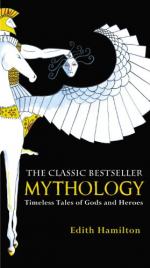|
|
Mythology Topic Tracking: Atrocity
Atrocity 1: The life cycle of Dionysius is parallel to the cycle of the vine, but it is gruesome. Every year he is torn apart to bloody pieces by his own followers. The Maenads perform this deed on their enemies as well as their god. Orpheus suffers this fate too.
Atrocity 2: Cronus savagely defeated his father by castrating him. When Ouranos lost his testicles, he became incapable of breeding and lost his sexual and social power. To avoid being defeated himself, Cronus ate his own children whenever they were born. In this, however, he alienated his wife and made the worst enemy he could.
Atrocity 3: So many objects of beauty in ancient Greece have their roots in something base and violent. Narcissus' flower came not from violence but excessive vanity. The Hyacinth, however, is red because of blood. This theme, beauty emerging from the ugly and destructive, continues throughout mythology.
Atrocity 4: Beautiful things keep coming out of terrible circumstances. Pyramus and Thisbe are the perfect example of this. Their denied love ends up in both of their deaths, turning the mulberries red from white. Often, lovers are turned into birds so that they may be together forever; this is the fate of Ceyx and Alcyone. Orpheus, a musician of great beauty, not only suffers the pain of losing his wife twice, but also suffers the same death as Dionysius.
Atrocity 5: The story of the Quest for the Golden Fleece is filled with brutality. It begins with the attempted sacrifice of a child by a jealous stepmother. Jason must fight many things to get to the fleece. Medea chops up her brother and throws him into the ocean. This is grotesque (merely for the imagery) and savage because they are siblings. Pelias suffers the fate of being killed in a similar way by his own children. When Jason snubs Medea, she kills his fiancee, her own children, and then disappears.
Atrocity 6: Killing one's own child and grandchild is an atrocity that Acrisius cannot commit, but he is not beyond leaving it up to the gods. This sort of murder is common in Greek mythology. If you expose a family member to the elements, you thereby absolve yourself of responsibility for their death: the gods must choose to let the people live or die.
Atrocity 7: Hercules, the greatest hero of Greece, also commits some of the most heinous crimes against family members and others. He is known for his savage anger. He brutally kills his family in a fit of rage. He kills teachers and lashes out at friends who insult him. Nevertheless, because of his incomparable strength, he is able to atone for these sins when others could not.
Atrocity 8: War's atrocity is not just on the battlefield, where the blood flows freely, but it is also in the allied camp and after the battle. Ajax kills himself in a rage after he does not get Achilles' armor. The people of Troy are slaughtered brutally and the city is emptied of its inhabitants. At the end of the battle, the men are all killed and the women are taken captive. The death of Andromache's son is brutal, but necessary to the invaders. A dead son never tries to avenge his father.
Atrocity 9: Violence is not prevalent in the Aeneid until the later books where it becomes the thematic mainstay. The messengers to Aeneas are brutally cut down after they kill many sleeping natives. Aeneas himself cuts down a man as he begs for mercy.
Atrocity 10: The house of Atreus is filled with atrocity. Tantalus feeds his child to the gods. Atreus feed his brother his own children. Agamemnon sacrifices his daughter. Clytemnestra kills her husband. Orestes kills his mother. Even in mythology, the scale of this carnage is unparalleled.
Atrocity 11: Oedipus discovers he has, unknowingly, married his mother and killed his father. Such a realization would be just as repugnant to those living in the ancient world as it is to modern readers of Sophocles. Creon's decree that the bodies of those who opposed Eteocles' claim to the throne not be buried, is truly savage in the ancient world. An unburied body's soul would wander the world forever. Oedipus inflicts his own gory punishment for his crimes and Jocasta does the same.
Atrocity 12: Philomela is raped by her sister's husband. She cannot report this deed to anyone else, because he cuts her tongue out. In response to this brutality, Procne (her sister) kills her child and feeds it to her husband.




